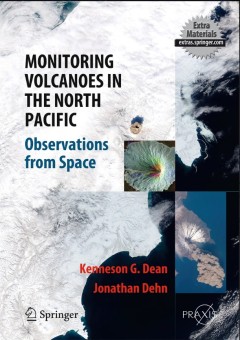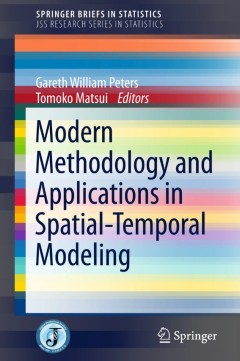Filter by

Monitoring Volcanoes in the North Pacific:Observations from Space
This book provides a unique visual experience, showing satellite images of volcanic eruptions worldwide and detailed observations from the North Pacific ‘ring of fire’. Daily volcano monitoring and analysis from this region have resulted in one of the most detailed collections of satellite images in the world. An international team of experts has provided comprehensive cov…
- Edition
- 1
- ISBN/ISSN
- 978-3-540-24125-6
- Collation
- XXXIII, 363
- Series Title
- Springer Praxis Books
- Call Number
- -

The Sustainability of Agro-Food and Natural Resource Systems in the Mediterra…
This book is focused on the challenges to implement sustainability in diverse contexts such as agribusiness, natural resource systems and new technologies. The experiences made by the researchers of the School of Agricultural, Forestry, Food and Environmental Science (SAFE) of the University of Basilicata offer a wide and multidisciplinary approach to the identification and testing of differ…
- Edition
- -
- ISBN/ISSN
- 978-3-319-16357-4
- Collation
- -
- Series Title
- -
- Call Number
- -

The Structure and Stability of Persistence Modules
This book is a comprehensive treatment of the theory of persistence modules over the real line. It presents a set of mathematical tools to analyse the structure and to establish the stability of such modules, providing a sound mathematical framework for the study of persistence diagrams. Completely self-contained, this brief introduces the notion of persistence measure and makes extensive use o…
- Edition
- -
- ISBN/ISSN
- 978-3-319-42545-0
- Collation
- -
- Series Title
- -
- Call Number
- -

Modern Methodology and Applications in Spatial-Temporal Modeling
This book provides a modern introductory tutorial on specialized methodological and applied aspects of spatial and temporal modeling. The areas covered involve a range of topics which reflect the diversity of this domain of research across a number of quantitative disciplines. For instance, the first chapter deals with non-parametric Bayesian inference via a recently developed framework known a…
- Edition
- 1
- ISBN/ISSN
- 978-4-431-55338-0
- Collation
- XV, 111
- Series Title
- SpringerBriefs in Statistics
- Call Number
- -

State-of-the-Art and Future Directions of Smart Learning
- Edition
- -
- ISBN/ISSN
- 978-981-287-868-7
- Collation
- -
- Series Title
- -
- Call Number
- -
- Edition
- -
- ISBN/ISSN
- 978-981-287-868-7
- Collation
- -
- Series Title
- -
- Call Number
- -

The State of Deformation in Earthlike Self-Gravitating Objects
This book presents an in-depth continuum mechanics analysis of the deformation due to self-gravitation in terrestrial objects, such as the inner planets, rocky moons and asteroids. Following a brief history of the problem, modern continuum mechanics tools are presented in order to derive the underlying field equations, both for solid and fluid material models. Various numerical solution techniq…
- Edition
- -
- ISBN/ISSN
- 978-3-319-32580-4
- Collation
- -
- Series Title
- -
- Call Number
- -

The Soils of Taiwan
Physical Geography
- Edition
- -
- ISBN/ISSN
- 978-94-017-9726-9
- Collation
- -
- Series Title
- -
- Call Number
- -

The Soils of Iceland
In this new volume in the World Soil series, the various types of Icelandic soils, their different characteristics, their formation, degradation and erosion are reviewed. At the same time, the book also deals with the agriculture and land use in general to give a complete view of Icelandic soils. The first part details the natural parameters such as the climate and the geography of Iceland. It …
- Edition
- -
- ISBN/ISSN
- 978-94-017-9621-7
- Collation
- -
- Series Title
- -
- Call Number
- -

The Soils of Antarctica
This book divides Antarctica into eight ice-free regions and provides information on the soils of each region. Soils have been studied in Antarctica for nearly 100 years. Although only 0.35% (45,000 km2) of Antarctica is ice-free, its weathered, unconsolidated material qualify as “soils”. Soils of Antarctica is richly illustrated with nearly 150 images and provisional maps are provided for …
- Edition
- -
- ISBN/ISSN
- 978-3-319-05497-1
- Collation
- -
- Series Title
- -
- Call Number
- -

The Social Psychology of Intractable Conflicts Celebrating the Legacy of Dan…
This volume works explores a transferable theory of a specific social-psychological infrastructure, based on the work of Dr. Daniel Bar-Tal, that develops from cultures immersed in intractable conflicts. The book's approach to this issue is different from approaches that are predominant in social psychology. This is because an important inspiration of many scholars that contributed to the book …
- Edition
- -
- ISBN/ISSN
- 978-3-319-17861-5
- Collation
- -
- Series Title
- -
- Call Number
- -
 Computer Science, Information & General Works
Computer Science, Information & General Works  Philosophy & Psychology
Philosophy & Psychology  Religion
Religion  Social Sciences
Social Sciences  Language
Language  Pure Science
Pure Science  Applied Sciences
Applied Sciences  Art & Recreation
Art & Recreation  Literature
Literature  History & Geography
History & Geography